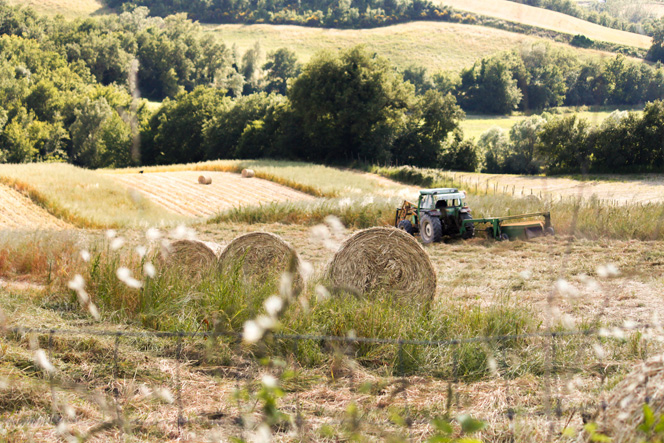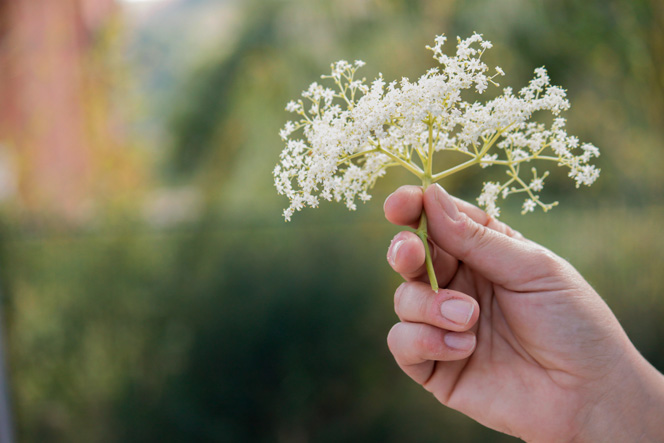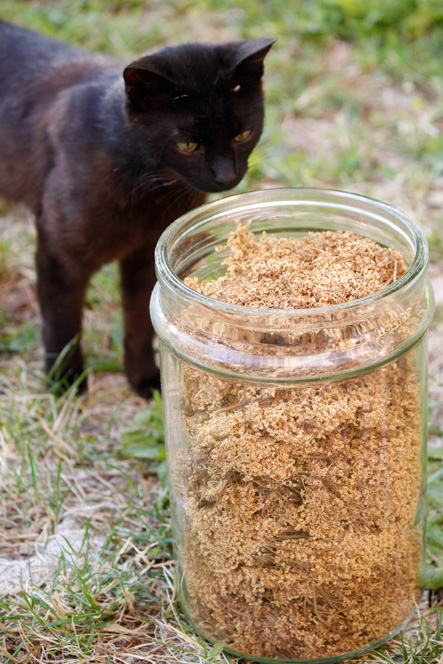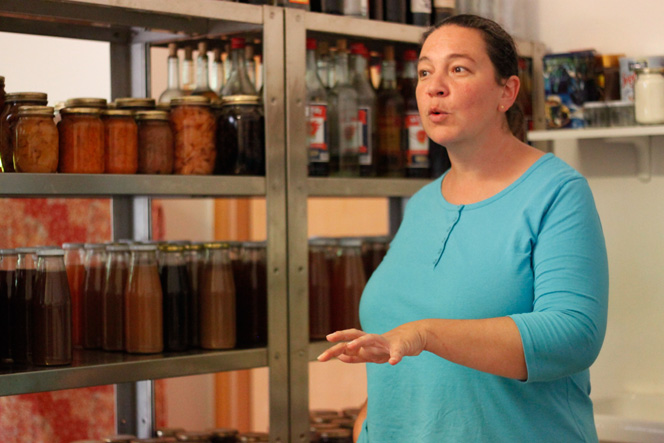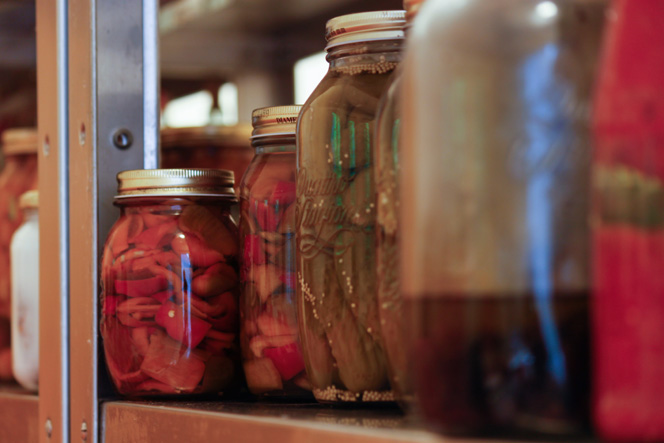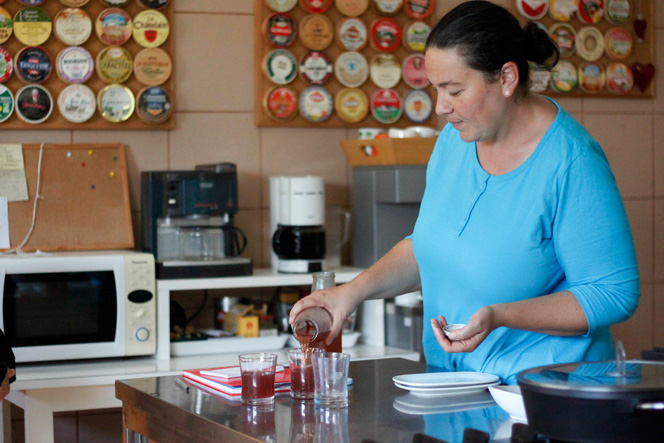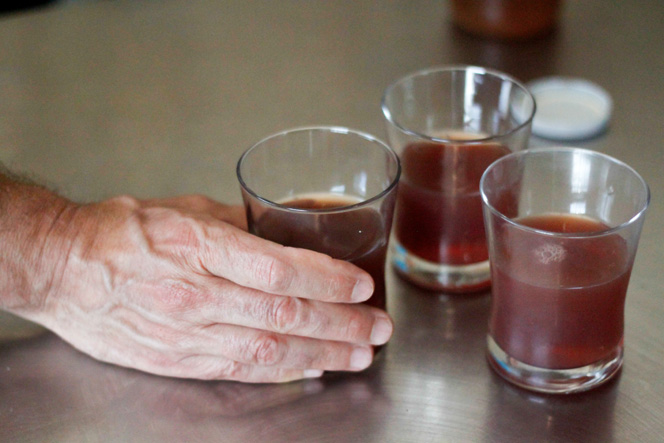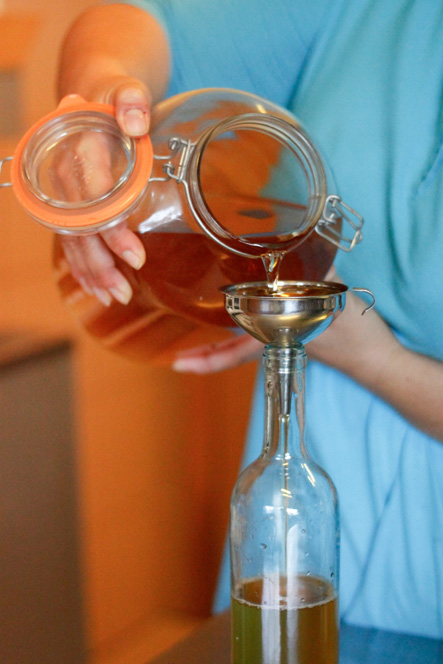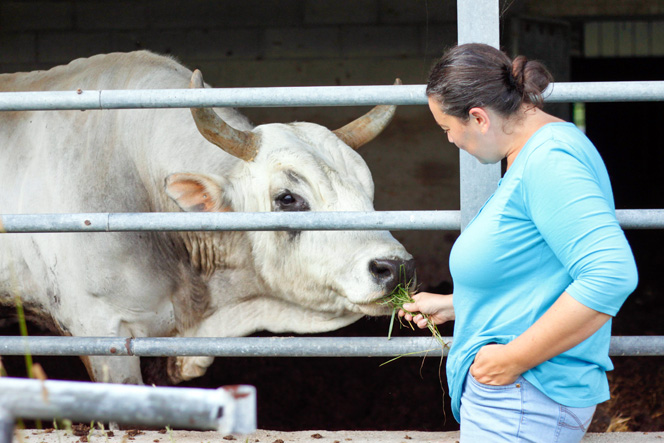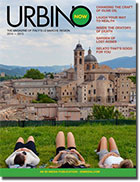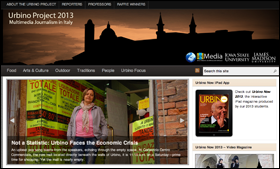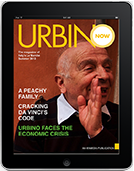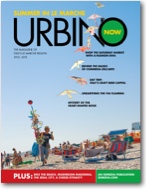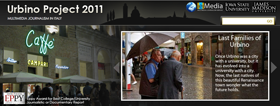Foraging for Simplicity
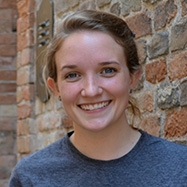
Meet Giulia Savini, a city girl turned organic farmer
Giulia Savini and I stroll down her gravel driveway alongside a fence overgrown with wild plants. Her farmhouse stands behind us, and in front of us spreads her vast farm, where we can see the afternoon sun glowing over fields of wheat and cow pens. Groomed mountains owned by neighboring farmers stretch into the distance. Savini grins and points towards a feathery fennel plant along the fence, explaining the many purposes of its leaves, flowers, and seeds. She hands a piece to me, saying, “Just bite a bit, it tastes a bit like licorice.”
Foraging, the practice of picking wild plants to make delicious meals, desserts, and liqueurs, is a way of life for Savini. She has been the primary owner of her family’s organic farm and inn, Valle Nuova, an agriturismo—or farm stay—about eight miles south of Urbino, since 2007. Savini raises organic cattle, accommodates travelers from around the globe, and incorporates wild plants into her everyday life in the kitchen.
Once a city girl, Savini is now a full-fledged country girl. She did not always live this way, though. As a child, she grew up in the lively city of Milan. She found it to be “boring,” while going to her grandparents’ house in the countryside was a “bit of freedom.” She says, “It was very normal for children to run free. You could just disappear for a whole afternoon and be back for dinner.”
Savini’s mother, Adriana Negri, also grew up with an active knowledge of plants, residing in a village near Lake Como before living in Milan. Negri remembers learning about wild herbs from her grandmother as a small child, who claimed to be a witch. With a sly chuckle, Negri explains, “She wasn’t really a witch, but she liked to say she was.” Negri continues, “She would have bottles of things and go around feeding everybody a spoon of God-knows-what,” claiming to use wild herbs for medicinal purposes.
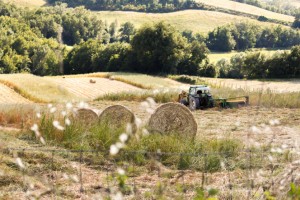
Giulia Savini’s organic farm and inn, called Valle Nuova, is nestled between groomed mountains in the Italian countryside eight miles south of the town of Urbino.
Although Savini lived in the city most of her adolescence, she nostalgically recalls time spent gardening with her granddad, “collecting strawberries for grandma.” She remembers finding joy in gardening because she could “be around [her] granddad in the countryside” as an escape from city life.
After a life spent picking berries in hot summers and maintaining a small kitchen garden in Milan, Savini’s parents decided to buy Valle Nuova in 1981. Negri explains they wanted to escape the corruption rampant in Italy at that time: “The late 70s and 80s were a difficult time in all of Italy. It was difficult to work if you were not affiliated to the right political party or you did not pay or know the right people, and that was not the way we wanted to live.”
“We wanted to live more naturally,” she adds, “and to be in contact with real things, not having to struggle to make a living.” Between 1981 and 1991, the family stayed in Milan while visiting the farm every month or so, delegating the actual labor to hired workers. In 1991, they moved permanently to Valle Nuova after Savini’s father saved enough money from his job as an architect in Milan.
Like her parents, Savini’s transition to owning and operating Valle Nuova was a long time coming. She decided to study at the University of Urbino in the ‘90s to remain close to her parents, then began living and working in Madrid during the winters and returning to the farm in the summers. “The first years were great,” she recalls, “because I felt like I had two lives, more than normal people do.”
Before she knew it, she began to feel differently: “I was never in the right place. So I decided I had to choose one or the other.” After a life spent in various Italian cities with occasional forays to the countryside, Savini officially took over the Valle Nuova operation in 2007. Of life in the city, she now says, “For a while it’s all right if you can escape, but I prefer to live the other way around—living here with my cats and nature and going on holidays to the city.”
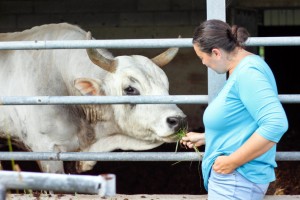
Savini feeds one of her two bulls a bit of organically grown grass. The cows at Valle Nuova are kept according to organic regulations and sold solely for their meat.
Savini now operates Valle Nuova as an organic farm, growing things the same way her parents did. The agriturismo’s website says, “Farming has gone through uncontrolled growth and development in order to meet an insatiable and diversified demand.” The mission of the farm is to reclaim past traditions and fuel a more sustainable Earth by “the use of composted manure, enriching the terrain with humus, ensur[ing] land fertility for the future and allow[ing] us not to use weed killers and chemicals because we reestablished the ecological balance of the earth.” Savini also raises organic Marchigiana cattle, meaning that they are fed organically grown grass and have pens with outdoor access half the year, roaming the fields for the other half of the year.
Savini’s sustainable practices have earned the respect of her neighbors. Like Savini, Ashley Bartner and her husband, Jason, operate a farm and inn, La Tavola Marche, and teach cooking classes with foraged wild plants. Bartner speaks highly of Savini: “Instead of being nearby rivals with similar mission statements, we have always been supportive of one another’s businesses and proud of each other’s successes. She is an inspiring pioneer of green eco-friendly farming and inn-keeping for years, which makes us strive to be better as well.”
Savini’s practices also inspire others around the world. Vivian Aldridge, a recent visitor, says, “I wanted to remind myself what it is like to live slowly and simply. These are important values for me to rediscover since I live in the high-paced tech world of the San Francisco Bay Area.” During her visit, she was rejuvenated by the fresh air and landscape of the Italian countryside. Savini’s influence doesn’t stop there though. Her website and blog allow others to learn about organic farming and foraging. Aldridge says, “Taste, freshness, and quality are of utmost concern to me, and Giulia continues to inspire me in that direction through her blogs and Facebook.”
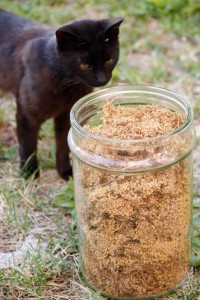
Several cats roam freely around Valle Nuova, where they camp out in front of the kitchen door in case any food comes their way. One adult cat curiously sniffed the dried Elderflower Savini always keeps on hand.
In addition to operating the farm, Savini has built a sturdy foundation of knowledge about foraging for plants, allowing her to gather wild ingredients for meals, desserts, and liqueurs. She doesn’t claim to be an expert on wild plants, because to her it is “really all about grandmothers and neighbors.” She learns from others’ experience whether something is poisonous. Her rule of thumb is to avoid plants she doesn’t know. For her, foraging is a tradition, not a science.
Walking into her small storage room with her playful dog, Chicca, running ahead, Savini proudly turns to several shelves crowded with jars of with earth-toned liquids and preserves. She likes to cook with fresh wild plants, but there is an inevitable problem: “All of them get ripe together, so you have to find a way to preserve them. That’s how you can eat them throughout the year.” She does this in many ways, by letting liqueur concoctions marinate for a year or more, making smooth flavorful juices, or jarring several types of jams.
Savini’s favorite wild plant to use in the kitchen is the Elderflower, a fragrant, cream-colored, small flower that grows in bunches on the Elder tree. She keeps a large jar of dried Elderflower on the bottom shelf of her storage room, ready to use throughout the year. She hands me a piece of cake, saying, “My favorite ways of using it are in liqueur and drawing the flowers out, using them in cakes. You can use a plain cake batter and add the flowers.”
As we share our snack, Savini says, “When you’re dealing with live things and the weather, many things can happen so you have to adapt to what nature brings.” You could say Savini has done just that.
This article also appears in Urbino Now magazine’s La Gente section. You can read all the magazine articles in print by ordering a copy from MagCloud.



